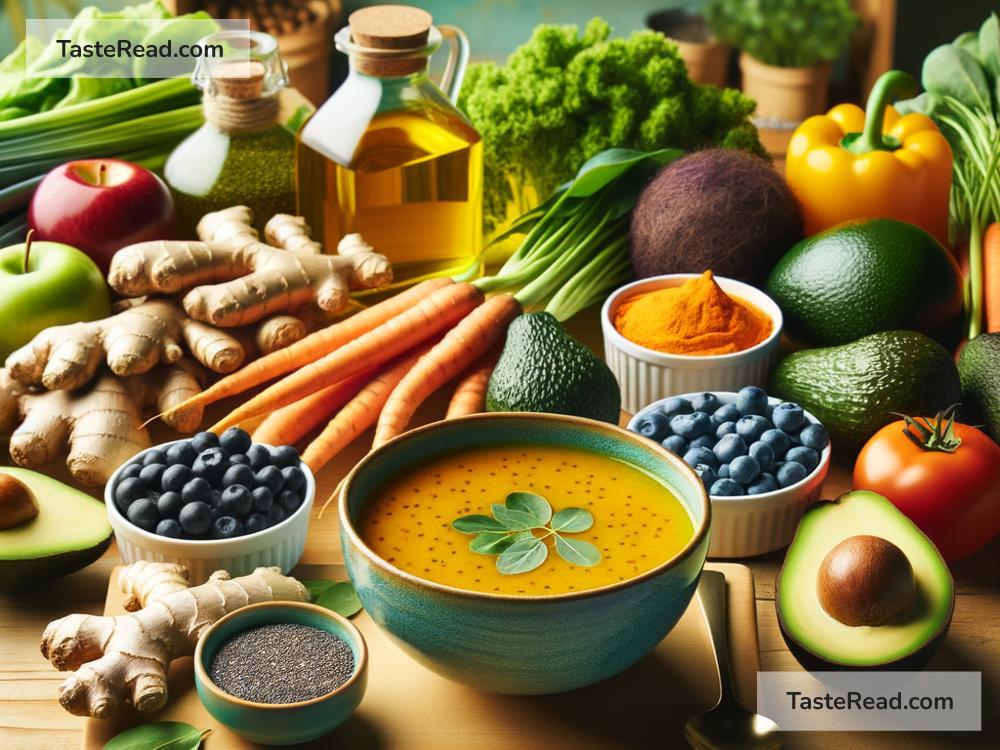Foods That Reduce Inflammation in the Digestive Tract
Inflammation in the digestive tract can cause discomfort, bloating, and poor digestion. If left unchecked, it may lead to bigger digestive problems like irritable bowel syndrome (IBS), Crohn’s disease, or ulcerative colitis. Luckily, what we eat can play a major role in reducing inflammation and promoting gut health. Including anti-inflammatory foods in your diet can help soothe your digestive system and keep it functioning well. In this article, we’ll explore some of the best foods that can naturally reduce inflammation in the digestive tract—and they’re all easy to add to your meals!
1. Ginger
Ginger is a natural anti-inflammatory powerhouse. This spicy root has been used for centuries in traditional medicine to treat gut-related issues. Ginger contains compounds called gingerols and shogaols, which help calm inflammation in the digestive tract.
You can use fresh ginger in your cooking, steep slices in hot water to make ginger tea, or add powdered ginger to smoothies. Ginger is also excellent for relieving nausea and reducing bloating, making it a perfect choice for soothing stomach discomfort.
2. Turmeric
Turmeric is another golden root famous for its anti-inflammatory properties. Its active ingredient, curcumin, has been shown to lower inflammation throughout the body, including the digestive system. Turmeric may help people with conditions like IBS or Crohn’s disease by easing gut irritation.
To boost turmeric’s effectiveness, pair it with black pepper, which helps your body absorb curcumin better. Sprinkle turmeric into soups, stir-fries, or rice dishes, or enjoy it in a warm turmeric latte.
3. Leafy Greens
Dark, leafy greens like spinach, kale, and Swiss chard are packed with vitamins, minerals, and antioxidants that support gut health. They are rich in fiber, which feeds the good bacteria in your gut and helps keep your digestive system running smoothly.
Leafy greens also contain compounds that reduce inflammation, like vitamin K and folate. Whether you toss them into a salad, blend them into a smoothie, or sauté them as a side dish, leafy greens are a great way to nourish your gut.
4. Blueberries
Blueberries are small but mighty when it comes to fighting inflammation in the digestive tract. They are loaded with antioxidants called anthocyanins, which help reduce swelling and protect gut tissue from damage.
Adding blueberries to your breakfast oatmeal, yogurt, or smoothie can provide a sweet and healthy boost for your gut. Other berries, such as strawberries, raspberries, and blackberries, also have similar gut-friendly benefits.
5. Yogurt and Fermented Foods
Probiotic-rich foods, such as yogurt, kefir, sauerkraut, and kimchi, help balance your gut bacteria. These foods are loaded with live, healthy bacteria that can reduce inflammation and support digestion by improving your gut microbiome.
Choose plain, unsweetened yogurt to avoid unnecessary sugars, which can worsen inflammation. A daily dose of fermented foods can work wonders for overall gut health.
6. Avocados
Avocados are creamy and delicious fruits that are rich in healthy fats and antioxidants. They contain monounsaturated fats, which can reduce inflammation throughout the body, including the digestive system. Avocados also pack fiber and important nutrients like potassium and magnesium.
You can slice avocados for sandwiches, mash them into guacamole, or use them as a topping for salads. They’re versatile and easy to incorporate into meals.
7. Salmon and Fatty Fish
Fatty fish like salmon, mackerel, sardines, and tuna are high in omega-3 fatty acids, which are known for their anti-inflammatory effects. Omega-3s can help reduce gut inflammation and boost the health of your intestinal lining.
Enjoy baked or grilled salmon as a main dish, or grab a can of sardines to enjoy as a snack. For those who don’t eat fish, plant-based sources of omega-3s like chia seeds, flaxseeds, and walnuts can also help.
8. Whole Grains
Unlike refined grains, whole grains like oats, quinoa, brown rice, and barley retain their fiber and nutrients, making them easier on the digestive system. The fiber in whole grains helps feed beneficial gut bacteria and reduces inflammation in the digestive tract.
Try switching from white bread to whole-grain bread, or opt for oatmeal instead of sugary breakfast cereals for a gut-friendly start to your day.
9. Olive Oil
Extra virgin olive oil is one of the healthiest fats you can use when cooking. It’s full of antioxidants and monounsaturated fats that can reduce inflammation and protect gut cells from damage.
Use olive oil as a salad dressing, drizzle it over roasted vegetables, or substitute it for butter in your cooking.
10. Herbal Teas
Certain herbal teas have soothing properties for the digestive system. Chamomile tea, for example, can calm inflammation and relax the muscles in your gut. Peppermint tea is also great for reducing bloating and easing stomach discomfort.
Sip on herbal teas between meals to give your digestive system a gentle and calming break.
Simple Lifestyle Tips to Keep Gut Inflammation at Bay
Along with eating anti-inflammatory foods, make sure to drink plenty of water, avoid highly processed foods, and eat slowly to help your digestive system work smoothly. Stress can also make inflammation worse, so taking time to relax and practice mindfulness can benefit your gut health too.
Conclusion
A healthy digestive system is the foundation of overall well-being, and the foods we eat play a critical role in fighting inflammation and promoting gut health. By including anti-inflammatory foods like ginger, turmeric, leafy greens, blueberries, fermented foods, and fatty fish in your diet, you can reduce discomfort and help your digestive system thrive. Simple food choices can lead to big improvements in how you feel—starting today!


